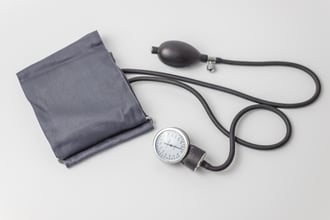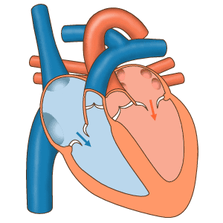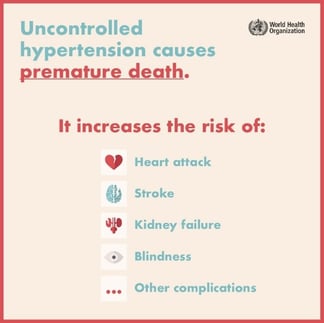Do You Understand What Your Blood Pressure is & What Your Numbers Mean?

You’re sitting on the table in the exam room at your doctor’s office as a nurse takes your blood pressure. You hear the Velcro release as she takes the cuff off and says “136/88, a little high”. You nod, even though you don’t fully understand what those numbers mean or if “a little high” is all that bad.
Does this sound familiar?
Blood pressure is a common measurement and it is important to understand what it is, what the numbers mean, and why healthcare providers care so much about it.
The First Step to Understanding Blood Pressure is to Understand Your Heart.

-
- Your heart acts as a pump, pushing blood throughout your body to deliver oxygen and other essentials to cells. The blood is pumped through vessels (arteries, veins, and capillaries).
- It can be helpful to think of your blood vessels as garden hoses or water pipes. Following this metaphor, the level of water pressure coming out is analogous to the level of blood pressure traveling through your vessels.
If Our Blood Vessels Are Like Water Hoses & More Pressure Means More Water, Why Would it Be Bad to Have High Pressure?
- In the following video, three cardiologists discuss this very question. They point out that if your blood pressure is too high it is like spraying your delicate organs- such as your brain, eyes, and kidneys- with a fire hose. Or perhaps like watering your flower bed with a power washer. Our organs are not designed or able to tolerate such high pressure and will become damaged if the pressure is not lowered. Cardiologists Discuss High Blood Pressure
- Uncontrolled hypertension increases the risk of diseases associated with the above-mentioned organ damage, such as heart attack, stroke, kidney failure, and blindness.
- Uncontrolled hypertension also damages the blood vessels themselves.
One Out of 3 Adults With High Blood Pressure in the U.S. Aren't Even Aware They Have it.
- High blood pressure is commonly nicknamed the “silent killer” because many people do not know they have it until it has already caused serious health problems.
- Hypertension develops slowly over time and has subtle symptoms if any at all.
- High blood pressure by itself is usually invisible, measuring blood pressure is a way for your doctor to see it.
What Do My Blood Pressure Reading Numbers Mean?
The amount of pressure exerted on our blood vessels as the heart is actively pumping is referred to as “systolic” blood pressure. This is the top number in your blood pressure reading.
- While we don’t want our blood pressure too high, it is also important that our blood pressure isn’t too low. If your blood pressure is too low, it would cause you to pass out. Like most systems within our bodies, balance is key. Not too high, not too low.
While some people do struggle with low blood pressure (hypotension), most of the discussion around blood pressure is focused on high blood pressure (hypertension).
- A normal healthy blood pressure is less than 120 systolic and less than 80 diastolic, or as you may hear it said “120 over 80”. Anything above this falls into varying degrees of abnormality. A systolic blood pressure greater than 129 or a diastolic blood pressure greater than 80 is considered hypertension.
| Blood Pressure Categories | Systolic mm Hg (upper number) | Diastolic mm Hg (lower number) | |
| Normal | Less than 120 | and | Less than 80 |
| Elevated | 120-129 | and | Less than 80 |
| High Blood Pressure (Hypertension) Stage 1 | 130-139 | or | 80-90 |
| High Blood Pressure (Hypertension) Stage 2 | 140 or Higher | or | 90 or Higher |
|
Hypertensive Crisis (consult your doctor immediately) |
Higher than 180 | and/or | Higher than 120 |
The best way to know if you have hypertension is to get your blood pressure checked. Talk to your doctor about your blood pressure reading and the risk of hypertension.
Clinical Research
Chase Medical Research has experience in conducting trials for hypertension and many other diseases. If you are interested in participating in one of our trials, please check out our website for currently enrolling trials.
References:
- Facts About Hypertension. (2023, January 5). Centers for Disease Control and Prevention. Retrieved March 16, 2023, from https://www.cdc.gov/bloodpressure/facts.htm
- High blood pressure- premature death. (2019, December 17). World Health Organization. https://www.who.int/multi-media/details/high-blood-pressure---premature-death
- Talking With Docs. (2021, August 23). How High Is Too High For Blood Pressure? Cardiologist Explains [Video]. YouTube. Retrieved March 16, 2023, from https://www.youtube.com/watch?v=WTz0nARAxpA
- Understanding Blood Pressure Readings. (2023, February 2). American Heart Association. Retrieved March 16, 2023, from https://www.heart.org/en/health-topics/high-blood-pressure/understanding-blood-pressure-readings
- What Is High Blood Pressure. (2022, March 24). National Heart, Lung, and Blood Institute. Retrieved March 16, 2023, from https://www.nhlbi.nih.gov/health/high-blood-pressure
- Why high blood pressure is a "Silent killer". American Heart Association. (2022, November 30). Retrieved March 16, 2023, from https://www.heart.org/en/health-topics/high-blood-pressure/why-high-blood-pressure-is-a-silent-killer
- https://www.physio-pedia.com/File:Normal_heart_pumping.gif
Share This Post
Recent Posts
- The Relationship Between Obesity and Obstructive Sleep Apnea April 5 2023
- Cardiovascular Outcome Clinical Trials April 5 2023
- Diabetic Peripheral Neuropathic Pain April 5 2023
- Are All Types of Cholesterol Bad? April 5 2023
- Blood Pressure: The Highs, the Lows, and Everything in Between April 5 2023
Categories
- Clinical Trials
- Cardiovascular Disease
- Diabetes
- Obesity
- Kidney Disease
- Hypertension
- Pain Management
- Vaccine
- Cholesterol
- Chronic Obstructive Pulmonary Disease
- Diabetic Peripheral Neuropathy
- Migraine
- Osteoarthritis
- Biologics
- COVID-19
- Gastroesophageal Reflux Disease
- Irritable Bowel Syndrome with Constipation
- Lyme Disease
- Nonalcoholic Steatohepatitis
- Respiratory Syncytial Virus



